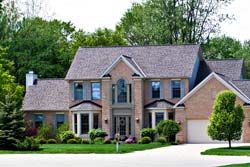Given the fact that property should be viewed as a long-term investment, it is essential for potential buyers to choose the right home that works for them and importantly fits their lifestyle.

Home buyers should buy a property that reflects their lifestyle. Even a small home can work well if the space fits the buyer and is utilised in the right way.
This is according to Adrian Goslett, CEO of RE/MAX of Southern Africa, who says while buyers should look at the property they purchase as an investment and consider factors that could affect the long-term appreciation of the property’s value, it is just as important that they simply 'love the house'. "Often buyers may look at the checklist of features that the home has on offer, but don’t necessarily consider the experience of living in the home and how living there may impact on their daily lives."
He says unless they are property investors purchasing the property as part of their portfolio, buying a property purely for its possible resale value can be a mistake.
"Essentially, if home buyers bought a house that they loved and wanted to live in, chances are the property will have a good resale value and other people would want to live there too.”
He says when buyers look at a property they should consider how they intend to use and live in the space. This will give them an indication as to whether it is the right home for them and if it will suit their needs for the period they intend to stay in it. “Even a small home can work well if the space fits the buyer and is utilised in the right way."
The buyer needs to ask questions such as what are the things they like doing on weekends or during the evenings, says Goslett. "Where do they like to eat or is entertaining an important element of their lifestyle?"
These considerations will help evaluate whether or not the home or area is right for them and steer them towards the home that fits best - "it’s about learning to read the house and knowing what you are looking for", he says.
Goslett advises that when considering these things it is important that the buyers try to think long-term and see how their future plans could change their lifestyle requirements over time. “It might make sense to purchase a smaller property now, however, if the buyers plans include having children or perhaps having their parents come and stay with them in the next five to ten years, maybe a home with an extra bedroom or the space to expand is a better option in the long run.
"Although it is impossible to predict what the future holds, it is still important to plan for what is likely to happen and perhaps for a few things that aren’t.”
According to Goslett, buyers need to keep in mind three main elements when considering each property that they view – functionality, cost and enjoyment.
If a home meets all the requirements such as the number of bedrooms and proximity to place of work or schools, that is function. Cost is the asking price of the property along with all the other costs involved in the property sales transaction and day-to-day costs of owning the home. Enjoyment would be the lifestyle offering and what the buyer would get out of living in the home. Adding this into the equation will help balance out function and cost, assisting the buyer in making the right decision for them.
The enjoyment factor will be different for every buyer depending on their life stage and preferences, he explains. "It might be proximity to a favourite coffee shop, a beautiful view or the back garden. It might be inside the home or outside the home, all depending on what it is that the buyer enjoys.”
If a buyer purchases a house that they love and works for them, they will have more than just a property, they will have a home, he says.








